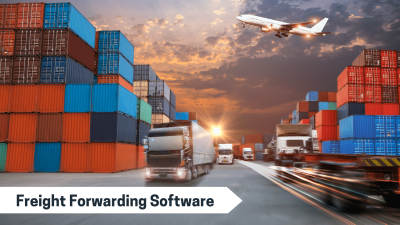Since the start of the epidemic, problems have arisen in the domestic and international supply chains that freight forwarders have never encountered. Digital Freight forwarder software operating procedures have been altered because of staffing shortages, route disruptions, financial problems, and freight forwarding challenges.
An article claims that in 2023, the global logistics market developed rapidly. By 2026, North America will dominate the market, even overshadowing the Asia Pacific sector. In 2023, about half of the e-commerce logistics were accounted for by the worldwide 3PL freight software fulfillment market.
Freight forwarders now have a harder time locating and managing their cargo due to the increase in demand for e-commerce and logistics. For operations to be streamlined and to give shippers and customers real-time updates, a digital freight management system is now required for businesses. Let’s check the freight management software and its key challenges with BoxOn.
The 7 Most Important Challenges for Freight Forwarders
1. Environmental issues and rising fuel prices:
The freight forwarding software business has been severely impacted by rising fuel prices because a sizable amount of its expenses is related to fuel. Carriers either raise prices or suffer a loss as fuel prices rise. The entire sector is impacted by fuel prices. Freight management software must raise their prices to cover rising transportation expenses, which forces the shipper to do the same, forcing the recipient to do the same.
Diesel fuel, specifically, is a major source of environmental pollution and is used by digital freight forwarding companies. Maintaining affordable, efficient, and pollution-reducing freight shipping techniques is a major challenge for the sector.
2. Raising Standards for Customer Service:
In the era of technology and readily available apps, customers want rapid gratification. In the shipping sector, getting items from point A to point B requires several different moving parts. These factors may result in a gap in production and communication, which may postpone reaching out to customers.
The usage of digital freight forwarders offers integrated technology with freight management systems that provide clients and customers with accurate and timely information.
3. Exceptional Requirement for Management:
The interruption or even shutdown of the supply chain is threatened by market volatility and unpredictability. Providing real-time data and visibility is one way to address these issues. By enabling immediate warnings and alerts when an exception occurs, digital freight forwarding lays the framework for management by exception. This enables digital freight forwarding companies to lower risks, enhance planning, and offer real-time communication to consumers.
4. Conflicting contract details and cultural barriers:
Barriers and ambiguity about contract terms might be brought on by international shipments and freight forwarding. The process to avoid contractual delays will be made easier by implementing 3PL freight software, which will also make it easier to navigate these cultural gaps.
The platform offers a simple method for keeping documentation organized and in one convenient place. Maintain up-to-date cargo weight, shipping charges, and precise export paperwork, as well as customs forms and information.
5. Poor stakeholder communication:
It’s simple to become overburdened as a digital freight forwarder by the volume of paperwork and messages you must monitor. Misplacing important information at least once can almost seem unavoidable unless your system is impenetrably secure.
Nevertheless, delayed communication or inaccurate information might cost you a customer, regardless of how chaotic your duties may be. Even if you can keep your information organized, you might be spending more time than you anticipated searching through a disorganized system.
6. Adapting Record-Keeping Rules:
By keeping records, you can guarantee that they will be available when needed. Freight forwarders must maintain these documents for a specific amount of time for liability, effectiveness, and production reasons. The use of Digital freight forwarder software enables shippers to stay up to date on changes to real-time record-keeping standards.
7. Unexpected slow time:
Where’s my shipment? is undoubtedly a query that most freight forwarders are all too acquainted with. Unfortunately, there are other factors, such as bad weather, unforeseen detours, or last-minute route modifications, that might cause delays.
Even though you usually have no influence over the reason for a late shipment, you are still in charge of giving irate shippers a revised delivery date.
BoxOn’s freight management software will help you to increase your forwarding business.
Conclusion:
In a world where technology is central, it is important to stay up to date with changes and the newest technology. Freight forwarders face many difficulties, including constantly evolving rules and a fiercely competitive industry. Fortunately, moving to a freight management system with BoxOn helps reduce those issues as you gather more information and improve team and customer efficiency.
Make sure your freight-forwarding operation runs well. Use 3PL freight software created especially for online freight forwarders and get in touch with BoxOn Logistics right now! To know more https://www.boxonlogistics.com/request-demo/






COMMENTS